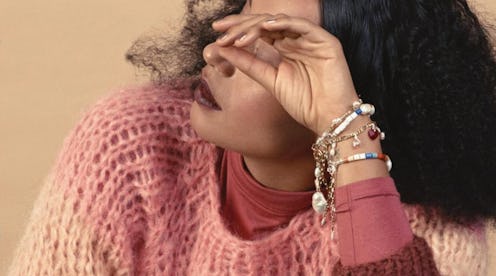(Fashion)
The Quickest Way To Find Out If Your Jewelry Is Sustainable

Within the realm of jewelry, sustainability takes on many forms. The word sustainability itself can feasibly be broken out into different branches related to the sentiment: eco and environmentally-friendly, ethical, conscious, responsible — it depends on who you're asking. But indisputably, the importance of it all only increases with time. It's no longer enough to use recycled gold or to ensure that employees are paid fair wages. As new insights are learned and technologies developed, it's ever more important to educate yourself on if the jewelry you wear is sustainable, and what that even means from brand to brand (since there are often a wide range of definitions). Not sure where to start?
Thankfully, a few jewelry designers who advocate for environmentalism (and all the tidbits that come along with it) are here to share their knowledge of how to ensure your next jewelry purchase is made by a brand that cares about both the planet and the people who reside there. Ahead, discover the four main categories to consider when investing in new jewelry, hear straight from designers on what these buzzwords mean to them, and shop a slew of spring baubles that will not only brighten your wardrobe but also leave you with a clear conscience.
Responsible Sourcing
Precious stones are notorious for murky origins, so first and foremost purchase from a brand that sources from ethical suppliers. "Jewelers should always purchase from trusted vendors who can definitively state their stones' origins," Designer Melissa Joy Manning tells TZR. "Many mines are controlled by nefarious groups who use metal and stone mining to fund terrorism. It's imperative that we know where our stones come from so that we can mitigate our complicity in money laundering for these groups." Manning adds that jewelry lines should ensure their stones follow the Kimberly Process, which aims to eradicate conflict diamonds from the global supply chain.
Recycled Materials
"Using 100 percent recycled metal or fair trade gold is easy and there's no excuse not to use it — it is readily and commercially available," Manning explains. The designer's namesake brand produces the collections from its certified green studio in California and only works with recycled metals. Another approach is upcycling, which reimagines materials that would otherwise go into a landfill. New York-based brand SVNR employs upcycling processes with its colorful, creative earrings that have swept the street style scene as of late.
Clean Production
Other potentially negative impacts the jewelry industry could have on the environment hides within the production itself. First, ensuring your waste is minimized as much as possible is key. For example, Mexico City-based label Tuza takes leftover resin from their collection and crafts it into keychains and one-off items. Second, working toward using limited water and little to no chemicals should be at top of mind for designers. "[We use] Fluoride-free fluxes to mitigate air and chemical pollution and correct disposal techniques of pickles (washes we use in jewelry making) to neutralize any groundwater pollution," Manning shares.
Ethical Working Conditions
You hear a lot about ethical working conditions but what that exactly means can prove more nuanced than one might think. For example, Berlin-based Wald employ generations of women who work out of their homes. Designer Dana Roski tells TZR she "chooses mothers and grandmothers [for production], especially those living in the German countryside and were not working for a while because they're [sic] taking care of their kids."
Of course, being paid fair wages and working in a safe environment should go without saying. Melissa Joy Manning suggests that if jewelry is made out of house, designers "should visit the facility where the work is made and confirm that workers are paid well, receive benefits, and have published working hours."
Ahead, shop jewelry brands with ethical and environmentally-friendly practices.
This article was originally published on